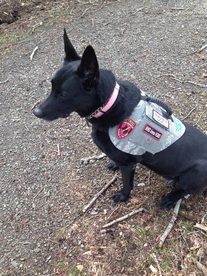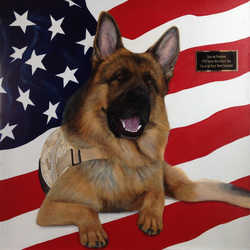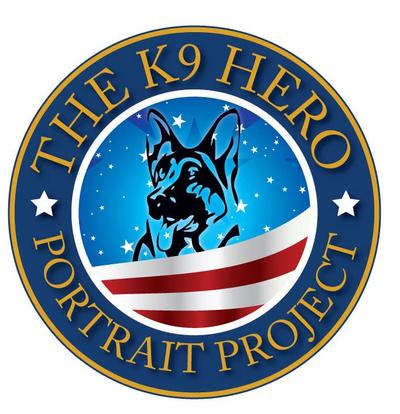Educating the Public on Working Dog Programs
& PTSD Service Dogs for our Veterans

Working dogs in the military or law enforcement are highly trained K9's who have been selected for their acute sense of detection skills. The U.S. DOD is just one of the organizations that provides trained military working dogs (MWDs) for patrol, drug and explosives detection and other specialized function. By the end of WWII, Germany had expertise in training nearly 200,000 dogs.
Several private agencies also train these incredible K9's for military and law enforcement operations, and are either sold or leased to the DOD. These K9's are labeled as "contract working dogs" (CWDs). They have the same, sometimes more intense training than the military working dogs, depending on the contractor. Both the MWDs and the CWDs are trained for the same tasks in Areas of Operation to protect our troops or stateside dignitaries.
The main difference between the CWDs and MWDs is the assignments. Just as the name describes, contract working dogs are leased for specific time frames or "contracts" at a time and can be transported to many locations, each with a different handler as needed. MWDs however, are typically assigned to one handler for their career, or as long as the handler is with the kennel, and can often be adopted by that handler when the DOD deems them either unfit for further duty or as 'EQ" (excess equipment). No handler likes to have their canine deemed as a piece of equipment, but I can tell you from all of the handlers I've spoken with, they get over those two words very quickly when they get those retirement papers for their canine partner.
CWD's however, do not get a chance to retire until they've reached a certain age or mission completion. Since the DOD does not own these canines, the contract working dogs must stay at their base location until an adoption takes place and the fees to cover transportation back to the states has been provided.
Military Acronyms Assigned to K9's
Some of the acronyms you may see next to a working dog's name:
MWD - Military Working Dog
CWD - Contract Working Dog
IDD - Improvised Detection Dog
EDD - Explosives Detection Dog
TEDD - Tactical Explosive Detection Dog
SSD - Specialized Search Detection
ND - Narcotics Detection
More information about the working dog program and handler specifics can be found at http://armypubs.army.mil/epubs/pdf/r190_12.pdf
You can learn more about the history and accolades of the K9HPP canines by visiting the Current K9 Heroes page and also the Completed K9 Heroes
Several private agencies also train these incredible K9's for military and law enforcement operations, and are either sold or leased to the DOD. These K9's are labeled as "contract working dogs" (CWDs). They have the same, sometimes more intense training than the military working dogs, depending on the contractor. Both the MWDs and the CWDs are trained for the same tasks in Areas of Operation to protect our troops or stateside dignitaries.
The main difference between the CWDs and MWDs is the assignments. Just as the name describes, contract working dogs are leased for specific time frames or "contracts" at a time and can be transported to many locations, each with a different handler as needed. MWDs however, are typically assigned to one handler for their career, or as long as the handler is with the kennel, and can often be adopted by that handler when the DOD deems them either unfit for further duty or as 'EQ" (excess equipment). No handler likes to have their canine deemed as a piece of equipment, but I can tell you from all of the handlers I've spoken with, they get over those two words very quickly when they get those retirement papers for their canine partner.
CWD's however, do not get a chance to retire until they've reached a certain age or mission completion. Since the DOD does not own these canines, the contract working dogs must stay at their base location until an adoption takes place and the fees to cover transportation back to the states has been provided.
Military Acronyms Assigned to K9's
Some of the acronyms you may see next to a working dog's name:
MWD - Military Working Dog
CWD - Contract Working Dog
IDD - Improvised Detection Dog
EDD - Explosives Detection Dog
TEDD - Tactical Explosive Detection Dog
SSD - Specialized Search Detection
ND - Narcotics Detection
More information about the working dog program and handler specifics can be found at http://armypubs.army.mil/epubs/pdf/r190_12.pdf
You can learn more about the history and accolades of the K9HPP canines by visiting the Current K9 Heroes page and also the Completed K9 Heroes
Retirement

If the canine is adopted at the end of their military career they can move on to be couch potatoes and family pets. Some of the canines still require a "job" of protecting and transition quickly over to new careers as service dogs. Although some agencies feel that a retired working dog should be just that, retired and allowed to live out the rest of their sometimes short lives as a loved family pet. We agree to some extent, but also feel that these highly trained sensory canines like to feel like they still have a "job" even if that is just staying by their new adoptive handler's side. The K9 Hero Portrait Project has painted many canines who have easily transitioned from military dog to service dog and are enjoying their days just as much while providing much needed support to our Veterans suffering from PTSD, TBI, or both. Many times these "new" service dogs are with their original handlers who are suffering from the devastating effects of PTSD from war.
Some breeds transition in to retirement differently depending on their energy level and health. Many of the retired canines from the DOD and contract programs have "aged-out" of the program or have a health issue that affected their performance. Only the top canines working at 100% can stay in the programs to protect our troops, so those showing the signs of "wear and tear" are quickly removed.
Some breeds transition in to retirement differently depending on their energy level and health. Many of the retired canines from the DOD and contract programs have "aged-out" of the program or have a health issue that affected their performance. Only the top canines working at 100% can stay in the programs to protect our troops, so those showing the signs of "wear and tear" are quickly removed.
Service Dogs for Disabled U.S. Veterans
 "Atlas The Wonderdog" -
The face of TBBF
"Atlas The Wonderdog" -
The face of TBBF
Did you know that an average of 22 Veterans commit suicide every day? PTSD and TBI (traumatic brain injury) are devastating and debilitating injuries sustained by many soldiers during combat. It wasn't until recently that the public and governmental programs accepted that PTSD is real and has lasting effects. Luckily, the Department of Justice Americans with Disabilities Act Laws prompted several organizations to form and recognize the need for task trained service dogs that detect when a persons stress or anxiety levels are peaking. Such tasks provided are waking a person from an anxiety nightmare triggered by PTSD, remind to take medications, pull the handler away from stressful situations and prompting for physical contact to alleviate stress levels and interrupt panic attacks.
Many Veterans must be a part of a service dogs training so that the canine can detect individual chemical composition in the body during levels of stress and triggers.
Training for these highly tasked service dogs costs tens of thousands of dollars, unattainable for many disabled Veterans. After obtaining a service dog of his own, Kenny Bass saw the harsh realities of that expense and wanted to help prevent the added stress of the financial burden for other Veterans by creating The Battle Buddy Foundation. TBBF provides service dogs and other alternative treatments to U.S. Veterans at no or very little charge. There are several organizations that are now providing service dogs at no charge, and at the same time are rescuing canines from euthanasia from local pounds. Many of the PTSD service dogs in active work are not full breed and are selected based on their ability to detect and be trained. So keep this in mind the next time you want a new family pet, some of the smartest and kindest canines are right at your local pound!
To learn more about The Battle Buddy Foundation, please visit www.tbbf.org
Many Veterans must be a part of a service dogs training so that the canine can detect individual chemical composition in the body during levels of stress and triggers.
Training for these highly tasked service dogs costs tens of thousands of dollars, unattainable for many disabled Veterans. After obtaining a service dog of his own, Kenny Bass saw the harsh realities of that expense and wanted to help prevent the added stress of the financial burden for other Veterans by creating The Battle Buddy Foundation. TBBF provides service dogs and other alternative treatments to U.S. Veterans at no or very little charge. There are several organizations that are now providing service dogs at no charge, and at the same time are rescuing canines from euthanasia from local pounds. Many of the PTSD service dogs in active work are not full breed and are selected based on their ability to detect and be trained. So keep this in mind the next time you want a new family pet, some of the smartest and kindest canines are right at your local pound!
To learn more about The Battle Buddy Foundation, please visit www.tbbf.org
K9 Hero Portrait Project Ambassadors
We are very excited to announce that in the near future, the K9HPP will have an ambassador program that involves PTSD trained canines that can come to your location and speak to your group about PTSD awareness and how service dogs can help. Stay tuned!
Donating for supplies via PayPal
If you would like to support The K9 Hero Portrait Project, you can purchase collectible challenge coins, or, submit a donation at the button below. Be assured that any amount you submit will go directly towards supplies and shipping for the K9 Heroes listed above. Thank you for your support.


